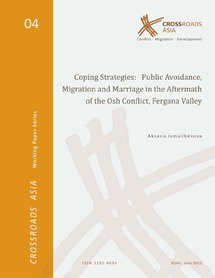Ismailbekova, Aksana: Coping Strategies: Public Avoidance, Migration, and Marriage in the Aftermath of the Osh Conflict, Fergana Valley. Bonn: Competence Network Crossroads Asia: Conflict – Migration – Development, 2012. In: Baldauf, Ingeborg; Conermann, Stephan; Kreutzmann, Hermann; Nadjmabadi, Shahnaz; Reetz, Dietrich; Schetter, Conrad; Sökefeld, Martin (Hrsg.): Crossroads Asia Working Paper Series, 4.
Online-Ausgabe in bonndoc: https://hdl.handle.net/20.500.11811/127
Online-Ausgabe in bonndoc: https://hdl.handle.net/20.500.11811/127
@techreport{handle:20.500.11811/127,
author = {{Aksana Ismailbekova}},
editor = {{Ingeborg Baldauf} and {Stephan Conermann} and {Hermann Kreutzmann} and {Shahnaz Nadjmabadi} and {Dietrich Reetz} and {Conrad Schetter} and {Martin Sökefeld}},
title = {Coping Strategies: Public Avoidance, Migration, and Marriage in the Aftermath of the Osh Conflict, Fergana Valley},
publisher = {Competence Network Crossroads Asia: Conflict – Migration – Development},
year = 2012,
month = jun,
series = {Crossroads Asia Working Paper Series},
volume = 4,
note = {This paper examines the changing survival strategies of Uzbeks in the aftermath of mass violent conflict in Osh in June 2010. After the riots, Osh Uzbeks were exposed to many difficulties. The Kyrgyz government used economic and political pressure to isolate minority groups from the titular nationality, and this opened the door to mistreatment of minorities in the form of the seizure of properties, job losses, and even verbal and physical abuse. Despite this mistreatment, however, Uzbeks have proved reluctant to leave the Osh area. Uzbeks have a long history of living in the region of Osh; strong emotional and historical sentiments bind them to the region and its graveyards and sacred sites. Uzbeks have thus had to develop alternative ways to cope with the uncertainty and insecurity of their situation. They have adopted strategies which reinforce their vulnerability on the one hand, but provide security for their children during post-conflict reconstruction on the other. These strategies include avoidance of public spaces and public attention, marrying daughters early, and sending male family members to Russia as labor migrants. These strategies are geared to the underlying aims of protecting the honor of the community, maintaining social networks, and preserving Uzbek identity without attracting attention. Uzbeks describe this strategy of patience as sabyrdu.},
url = {https://hdl.handle.net/20.500.11811/127}
}
author = {{Aksana Ismailbekova}},
editor = {{Ingeborg Baldauf} and {Stephan Conermann} and {Hermann Kreutzmann} and {Shahnaz Nadjmabadi} and {Dietrich Reetz} and {Conrad Schetter} and {Martin Sökefeld}},
title = {Coping Strategies: Public Avoidance, Migration, and Marriage in the Aftermath of the Osh Conflict, Fergana Valley},
publisher = {Competence Network Crossroads Asia: Conflict – Migration – Development},
year = 2012,
month = jun,
series = {Crossroads Asia Working Paper Series},
volume = 4,
note = {This paper examines the changing survival strategies of Uzbeks in the aftermath of mass violent conflict in Osh in June 2010. After the riots, Osh Uzbeks were exposed to many difficulties. The Kyrgyz government used economic and political pressure to isolate minority groups from the titular nationality, and this opened the door to mistreatment of minorities in the form of the seizure of properties, job losses, and even verbal and physical abuse. Despite this mistreatment, however, Uzbeks have proved reluctant to leave the Osh area. Uzbeks have a long history of living in the region of Osh; strong emotional and historical sentiments bind them to the region and its graveyards and sacred sites. Uzbeks have thus had to develop alternative ways to cope with the uncertainty and insecurity of their situation. They have adopted strategies which reinforce their vulnerability on the one hand, but provide security for their children during post-conflict reconstruction on the other. These strategies include avoidance of public spaces and public attention, marrying daughters early, and sending male family members to Russia as labor migrants. These strategies are geared to the underlying aims of protecting the honor of the community, maintaining social networks, and preserving Uzbek identity without attracting attention. Uzbeks describe this strategy of patience as sabyrdu.},
url = {https://hdl.handle.net/20.500.11811/127}
}






